ICICI Bank Data Breach: BASHE Ransomware Group Claims to Leak Customer Information

The BASHE ransomware group claims to have hacked ICICI Bank, threatening to release sensitive customer data if their demands are not met. This incident raises serious concerns for the banking industry and its cybersecurity measures.
- BASHE ransomware group claims they have accessed ICICI Bank’s customer database and are threatening to leak it on the dark web.

- The hackers have set a ransom deadline of January 24, 2025, and are demanding payment to prevent the data from being leaked.

- This group is known for targeting high-value businesses across industries like banking, healthcare, and technology globally.
- BASHE operates through the dark web using a TOR-based Data Leak Site, ensuring anonymity while pressuring victims.
- ICICI Bank has not confirmed the breach, but the news has spread widely on social media, with many users expressing concerns about their data.
- The Indian government classified ICICI Bank as “critical information infrastructure” in 2022, making this potential breach a matter of national security.
- In December 2024, the same group claimed to have breached Federal Bank, stealing over 600,000 customer records.
- Cybersecurity experts recommend immediate action, including notifying customers, strengthening security protocols, and working with law enforcement to track the attackers.
The ICICI Bank breach, if confirmed, underscores the increasing threat ransomware groups pose to critical institutions. Banks and businesses must prioritize advanced security systems to prevent such attacks. Customers are encouraged to monitor their accounts and stay alert for suspicious activity.
Net Protector Cyber Security emphasizes the importance of proactive cybersecurity strategies to safeguard sensitive data and combat evolving threats.
Comment(s)






